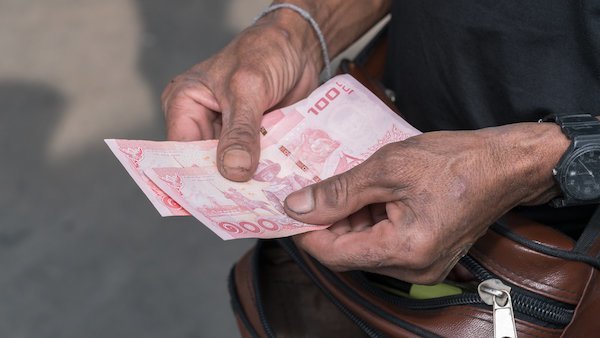With stunning temples, delicious food and a rich culture, the city of Chiang Mai is an excellent place to retire in Thailand. In the guide below, we tell you more about why Chiang Mai is becoming one of Asia’s most popular retreats, as well as the things you’ll need to consider when financing your retirement in the region.
Why is Chiang Mai Becoming a Popular Retirement Location?
Chiang Mai is rapidly growing in popularity among European and American expats. Though the city is 700km north of Thailand’s capital Bangkok, Chiang Mai offers a similar blend of Western and Eastern culture. Visitors in both cities will find cinemas, sports clubs, an active nightlife and Western shops such as Tesco and H&M. You’ll also find that reliable internet service (including wi-fi) is easy to find and that English is widely spoken.
Unlike Bangkok however, visitors to Chiang Mai report that the “New City” (its literal translation from Thai) is less chaotic and more tranquil. Located in the northern part of the country, Chiang Mai is surrounded by mountains, lakes and lush forests. The city itself boasts many beautiful gardens and exotic blooms.
Chiang Mai is also more compact than Bangkok and easy to get around by walking, scooter or a shared taxi. Over the years, a healthy community of Western expats has developed, creating extensive networks for social activities of all kinds.
Expats and tourists are well taken care of: healthcare is readily available and there is a special police task force dedicated to protecting visitors. So if you crave a safe, friendly community within a bustling city, at an inexpensive rate, you may want to consider a trip to Chiang Mai.

What are the Visa Requirements for Moving to Chiang Mai?
It is relatively easy to test out life in Chiang Mai, and Thailand in general. Most visitors receive a 30-day entry (no visa required) upon arrival at the airport. However, two-month tourist visas are recommended. These are easily acquired at Thai consulates in your home country, or in surrounding countries like Malaysia and Laos.
You can apply for a long-term retirement visa either in your home country or once you arrive in Thailand. This is a simple process, requiring proof of either income or of funds; a valid passport with 18 months left prior to expiry; and a one-time fee (to find out the amount, speak to your local consulate). Applicants must be at least 50 years old, and you may need to present medical certificates to demonstrate a clean bill of health.
A standard retirement visa is good for one year, after which you must apply for an extension. Expats are also required to check in with immigration every three months to verify they are still residing in Thailand, or face a small fine.
How Much Does it Cost to Live in Chiang Mai?
A typical day in Chiang Mai is considerably cheaper than in other major cities. Food stalls populate the city and you can purchase delectable Thai curries and noodles for between ฿30-100 (note that as of exchange rates in March 2023, ฿1 equates to around $0.029). Fresh, local produce is also affordable and readily accessible at markets around town. For example, 2lbs of fresh fruit will cost about ฿72 ($2), while locally brewed alcohol can be as little as ฿50-75 ($1.50-2.20).
If you like eating out, many different kinds of international cuisine are available in Chiang Mai, from local Northern Thai to Chinese to Italian, and even food from the American South! A good dinner for four people will generally cost about ฿2,000 (just under $60). Entertainment is cheap, as well. Movie theatres are all over the city and tickets run to around ฿100-150 ($3-5).
In addition, there are many festivals and holidays celebrated throughout the year in Chiang Mai. These occasions provide a plethora of cultural events and spectacles, many of which are completely free.

What is the Cost of Buying or Renting Property?
In terms of accommodation, prices can vary depending on where you are choosing to live. According to online property portal thailand-property.com, the average list price in Chiang Mai is ฿4.3m ($125,000) for condos and ฿10.1m ($293,000) for houses, while the cost of renting monthly ranges from ฿18,600 ($540) for condos to ฿86,760 ($2,518) for houses.
Remember that these figures account for properties in a variety of sizes, and prices could vary depending on if you are thinking about moving solo or with others. Either way, it’s worth contacting a reputable estate agent in the region to find out more.
Bear in mind that owning property in Thailand is trickier than renting; the government mandates that a non-Thai citizen may own a home, but no more than 48% of the land on which it is situated. Many expats overstep this law, opting to purchase spacious condominiums instead of houses.
Planning Finances to Retire in Thailand
Current exchange rates in Thailand are extremely favourable for visitors from the US, the UK and the EU.
At the time of this article's publication, one Thai Baht could be exchanged for the value below across the US dollar, pound and Euro (you can use our currency converter tools for the most up-to-date exchange) :
- $0.029
- £0.024
- €0.027
If you are planning a long-term stay in Thailand, opening a Thai bank account will make accessing your finances much easier. If you have been approved for your retirement visa, obtaining an account at a Thai bank tends to be much easier; typically, you need only present your passport and proof of residence. If you are on a tourist visa, matters may be more complicated, depending on the bank you are applying to.
Certain banks require recommendation letters, which can be from organisations within Thailand that you are affiliated with (such as an embassy or school), your bank within your home country or from a Thai citizen. You may also opt to choose a bank from your home country with branches in Thailand, and there are several to choose from; Citibank, HSBC, Deutsche Bank, Scotia Bank and Bank of America all have locations in Thailand.
Remember to think about whether you will be regularly transferring money back and forth. For example, if you plan to repatriate part of your pension, or if you plan to purchase property, you may want to work with a currency provider who can help you automate payments.
Retirement should be one of the most joyful transitions of your life. Now, with our helpful support staff and easy comparison tool, it can also be one of the most painless. Use our comparison tool today to find a money transfer specialist that can help make your transition to retirement in Thailand seamless. We can explore the best options for managing your retirement finances abroad, in Thailand or whatever destination you choose!








